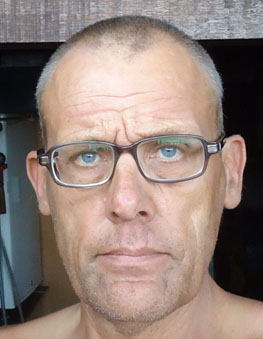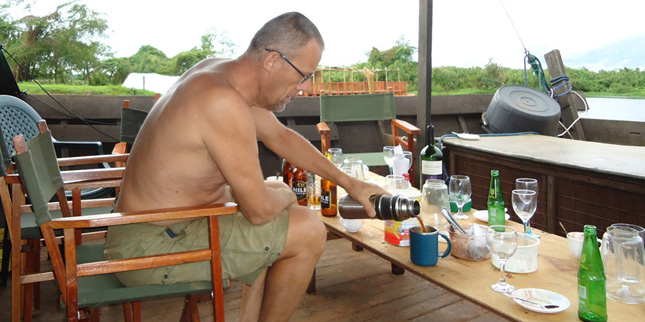
Crtd 11-05-07 Lastedit 15-10-27
Cardiovicissitudes
Approaching 60
I vividly remember my outright panic realizing, on my 28th birthday, that I would be 40 in only 12 years. In the generation watershed of the 1970s, people of 40 were the carcasses of history, endowed with World War II grudges, fingers ready to raise against light behaviour, moral qualms with the slightest deviation of "decent" standard life if not even outright fear of the Last Judgment. Now, more then 30 years later, I find it rather cool to approach sixty and to see the possibility of incoherency approaching. The beginning and the middle of my life already having been rather absurd, I can't wait to see what the last lap is going to be like. The test, I've been told, is whether you still remember the first name of Alzheimer. I test it daily. I still have it, at least after a decent morning coffee.

Yes, approaching 60 my attempts to look like an old man are getting more serious. New glasses

Before pictures in your photo albums cease to ring any bells (if only because several tropical lake storms soaked them in your dhow), pick some to scan to file and burn the rest

That also used to feel fresher...morning deck coffee after heavy party...what was that first name of Alzheimer again??
Woken up at night to compose a letter to my doctor
A record 6 day atrial fibrillation prompted me for the first time ever in Africa to opt for plan B: go to the doctor with my back-up bottle of flecainide. A drip containing flecainide sets your hart rhythm regular. Flecainide is a widely used and reputed drug, but forbidden by the expert niggers in charge of the list of the Uganda Drug Authority for import to Uganda (only bad drug producers pay the required bribe to get on the list?), so I hold my own stock of flecainide bought in The Netherlands. However, since the last time I did that, 10 years ago, the medical handbooks turned out to have changed: setting a hart regular after more than 2 days of fibrillation is now considered to risk shooting off blood clots causing strokes. So the doctor refused to apply the drip and put me on blood thinners first. "But if you don't set my heart regular it will probably reset itself in the coming days", I said. "Yes, that is equally dangerous but we have no drugs to keep you irregular" was the answer. Indeed my heart reset the same night. "I tried all my languages, but did not miss one of them", I joked to the doctor the next morning. "The chance is not so big", was the reply. The blood thinning, I learned, would require regular monitoring and adjusting of dose, at least every four weeks, for the rest of my life. My disbelief in a relevant risk after my experience of 10 years with more than 50 over-2-days fibrillations failed to impress anybody. I googled the literature and found what I had to say the next day: "This does not fit in my life style doctor". That rings a bell: it is also somewhere in the medical handbook. But still no sign to comply. At night I suddenly woke up realizing that, with the new handbook protocols, for a doctor, having to send patients to the intensive care with blood thinning complications is bad luck but with stroke is culpable negligence, a risk distribution quite different from that of the patient, I set to write and sign my immediate discontinuation of the procedure, on my own risk. Reliable sources subsequently reported my decision to have been accepted with no grudges. Next step of course was to see a good cardiologist to help me in the future defending myself against the latest medical handbook. Nairobi!
Nairobi! Golf pleasurable, parties in delightful and charming company. left to right Lydia, mother of Jessica, then me, Lucy and Willemijn